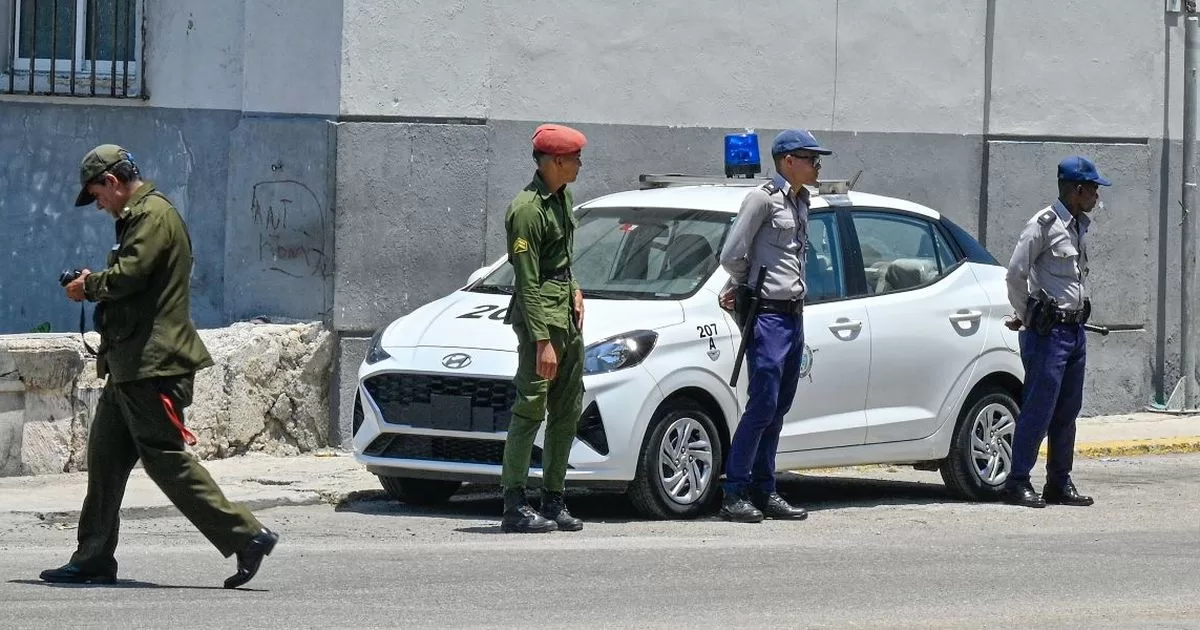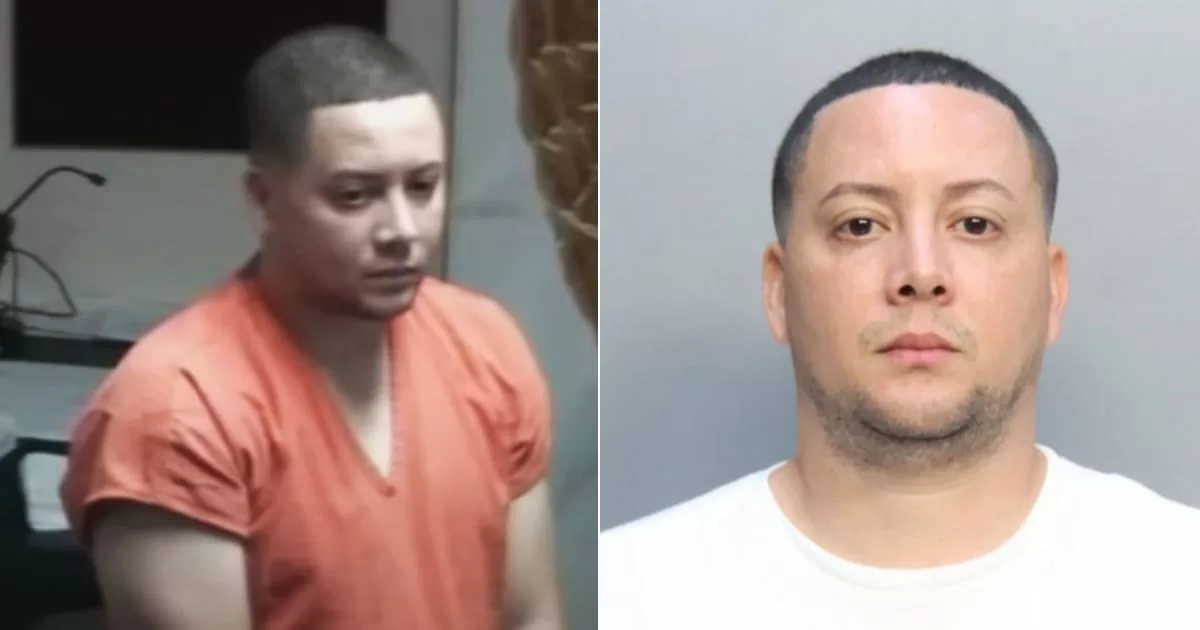The staging that precedes an act of repudiation works in Cuba like a Swiss clock. It is a choreography of terror. From early in the morning they place patrol cars in front of the home of the opponent or independent journalist, with the intention of intimidating him.
For anyone clueless and oblivious to the context, the atmosphere seems festive. In the case of that act of repudiation of Biscet, hours before, they set up an agricultural fair and installed speakers where salsa music was heard at full volume.
A former intelligence officer tells DIARIO LAS AMÉRICAS that “acts of repudiation or ‘revolutionary reaffirmation’ are a strategy learned from the Soviet KGB and Markus Wolf’s STASI in the defunct GDR (German Democratic Republic). Before, it was used by Mussolini and the Nazi hordes on Kristallnacht against Jewish businesses. The objective of these acts is to intimidate the opponent. In Hitler’s Germany his acolytes had a free rein to beat and kill. In Cuba they were perfected. Insulting, stoning, throwing eggs and hitting were allowed. When the atmosphere was most heated, the police appeared to ‘prevent the people outraged by the stateless people and mercenaries at the service of Yankee imperialism from lynching them’. The message is simple and direct: if you continue to bother us, we can kill you.”
Biscet, a doctor specializing in internal medicine, was then at the top of the blacklist of dissidents to be slandered by state propaganda. On June 9, 1998, he sent a letter to ruler Fidel Castro denouncing abortive methods with the use of the drug Rivanol. The following year he was fired from the national public health system.
He was already under the collimator of the special services when in 1997 he created the Lawton Foundation, with the purpose of peacefully promoting the defense of human rights, with strategies framed in the use of non-violent civil disobedience. The regime acted viciously against Dr. Biscet. Between 1997 and 2011, he spent a total of twelve years behind bars in stinking, humid two-by-two-meter dungeons.
The dictatorship saw in Biscet, a young mestizo, trained within the canons of Marxist teaching, a cancer that they had to remove. The ideological struggle, after Fidel Castro came to power, was based on the tactic that those who opposed his revolution were declassed, whether they were Batista or bourgeois. Oscar Elías was neither one nor the other.
Thanks to popularity and the blank check that the people gave him, Castro governed at his free will. He lied and manipulated the Cubans. When he was raised in the Sierra Maestra and later, when he held the position of Prime Minister, he claimed that he was not a communist, that he was a democrat and he confirmed that free elections would be held in Cuba.
Two years later, he allied himself with the Soviet axis, banned the free press and progressively confiscated private businesses. We Cubans applaud a political fraudster. In the early years, his opponents used the same tactics as Castroism to come to power: sabotage and armed struggle. Twenty-seven years later, on January 28, 1976, Ricardo Bofill, a university professor of philosophy, founded the Cuban Committee for Human Rights (CCPDH) together with Martha Frayde, among other activists.
When Bofill began to denounce the gross violations of political and expression freedoms by the olive green dictatorship, support for the regime was majority in Cuba. Most of us citizens were indoctrinated. Very few of us knew how the democratic model worked. We didn’t even know about human rights and respect for political differences.
The main contribution to Cuban political thought of Ricardo Bofill and the CCPDH was to design and assume peaceful resistance in the confrontation with the dictatorship. Persecuted and without resources, they collected reports of state abuses and then distributed them to foreign press agencies and Western embassies. They clandestinely distributed copies of the Universal Declaration of Human Rights, a document considered illegal, despite the fact that Cuba was a signatory on December 10, 1948.
Bofill and the members of the CCPDH were pioneers. The peaceful opposition, which, unlike the armed struggle, could not be defeated, continued to provide leaders such as Oscar Elías Biscet, Leonel Morejón Almagro, Vladimiro Roca Antúnez, Félix Bonne Carcassés, Martha Beatriz Roque Cabello and René Gómez Manzano. Then others from different political currents arrived. These are the cases of the social democrat Manuel Cuesta Morúa; those who are in favor of maintaining the embargo such as Antonio Rodiles, José Daniel Ferrer and Ángel Moya; supporters of citizen emancipation through the law such as Oswaldo Payá Sardiñas and intellectuals who support democratic socialism such as professor Alina Bárbara López.
Despite political differences, everyone agrees on respect for human rights. Among ordinary Cubans, who, paralyzed by fear, did not support the democratic projects of the peaceful opposition, there has also been a progressive change in mentality.
If 25 years ago the men and women who participated in the act of repudiation against Oscar Elías Biscet shouted ‘down with human rights’, with the arrival of social networks and new information technologies, the erosion of the inefficient economic model and the mediocrity of the current political class in Cuba, the narrative is different. During the protests of July 11, 2021 and others that followed, people who took to the streets demanded freedom, down with communism, and asked for the resignation of Díaz-Canel and the incapable leaders.
The change in thinking among citizens is notable, even within the dissident itself. I remember that before, out of caution or fear, many independent journalists used the word government in our articles when referring to the long-standing Castro autocracy. Not now. We consider the Cuban system a harsh and pure dictatorship.
On March 8, 1991, when I was arrested along with four young people from the neighborhood, accused of enemy propaganda, the ‘subversive material’ they seized from one of them were two Moscow News newspapers and a Universal Declaration of Human Rights. We were locked up for two weeks in a boarded-up cell in Villa Marista, headquarters of the Department of State Security. The prosecution threatened to sanction us with eight years in prison. The interrogator was convinced that “this spurious tome – the universal declaration – was part of a campaign of ideological diversion by the United States.”
The regime boasted that Cuba was the most democratic country in the world. Some people understood that human rights meant having guaranteed health and free education. Talking about political, economic, press and expression freedoms was a taboo topic.
If they criticized the political model or Fidel Castro, they did so quietly. Jokes against the government could be a crime. Still at the end of 2010, people on the street silently observed the fierce repression and beatings of women by the Ladies in White, who with gladioli in their hands demanded the freedom of fathers, sons, husbands or brothers imprisoned in the wave. repression of March and April 2003.
But that has changed. Today, people loudly criticize the communist party, offend leaders and shout ‘abusers’ at the police when they arrest someone with excessive use of force.
A decade ago, a friend disagreed with me on the issue of democracy. “Democracy cannot be eaten,” he told me. On the eve of the 75th anniversary of the Universal Declaration of Human Rights, the majority of Cubans on the Island have changed their minds. Now they are convinced that freedom is the most important thing.


